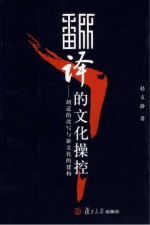图书介绍
翻译的文化操控 胡适的改写与新文化的建构 Hu Shi's rewritings and the construction of a new culture2025|PDF|Epub|mobi|kindle电子书版本百度云盘下载

- 赵文静著 著
- 出版社: 上海:复旦大学出版社
- ISBN:7309053095
- 出版时间:2006
- 标注页数:398页
- 文件大小:70MB
- 文件页数:421页
- 主题词:翻译-研究-英文
PDF下载
下载说明
翻译的文化操控 胡适的改写与新文化的建构 Hu Shi's rewritings and the construction of a new culturePDF格式电子书版下载
下载的文件为RAR压缩包。需要使用解压软件进行解压得到PDF格式图书。建议使用BT下载工具Free Download Manager进行下载,简称FDM(免费,没有广告,支持多平台)。本站资源全部打包为BT种子。所以需要使用专业的BT下载软件进行下载。如BitComet qBittorrent uTorrent等BT下载工具。迅雷目前由于本站不是热门资源。不推荐使用!后期资源热门了。安装了迅雷也可以迅雷进行下载!
(文件页数 要大于 标注页数,上中下等多册电子书除外)
注意:本站所有压缩包均有解压码: 点击下载压缩包解压工具
图书目录
Chapter 1:Introduction1
1.1 Rationale for Focusing on Hu Shi and the New Culture Movement3
1.2 Issues Reflected in the Neglect of Hu’s Rewritings14
1.3 Overview of the Book19
1.3.1 Structure19
1.3.2 Clarification of Terms and Presentation22
Chapter 2:Rewriting Theory25
2.1 The Theoretical Context Within and Outside Translation Studies28
2.1.1 The Shift from a Source -oriented to a Target-oriented Approach29
2.1.1.1 Literary Criticism30
2.1.1.2 Even-Zohar’s Polysystem Theory37
2.1.1.3 Hermans’ Anthology of Translation Studies40
2.1.1.4 Holmes’ Concept of Translation Sociology42
2.1.2 The Broadening of the Concept of Translation44
2.2 Rewriting Theory:An Overview50
2.2.1 The Control Factors52
2.2.1.1 The Concept of Control Factors57
2.2.1.2 Assessing the Notion of Control Factors61
2.2.2 Forms of Rewriting76
2.2.2.1 Assessing the Classification78
Chapter 3 :Hu Shi Canonised:The Interaction Between Ideology, Poetics and Patronage85
3.1 The Hu Shi Canon86
3.2 The Macro-Ideological Climate89
3.2.1 The Political Situation90
3.2.2 Official Attitudes Towards Learning from the West92
3.2.3 Reform in Education100
3.3 Hu’s Seminal “Eight Don’ts”, its Nature as Rewriting and its Impact on Literary Circles102
3.3.1 The Essay106
3.3.2 Hu’s Essay as Rewriting115
3.3.2.1 The General Influence of the Renaissance Model115
3.3.2.2 The Influence of Pound’s “A Few Don’ts”127
3.3.3 The Impact on Chinese Language , Literature and Translation133
3.4 Institutional Settings and Patronage139
3.4.1 Hu Shi and New Youth140
3.4.2 Hu Shi and Beijing University147
3.4.3 Support from Professionals157
3.5 Conclusion164
Chapter 4 :Hu Shi’ s Rewritings of Ibsen and Their Impact on Chinese Society167
4.1 Ibsen as Seen in the Eyes of His English Rewriters168
4.1.1 Major Sources Through Which Hu Shi Accessed Ibsen168
4.1.2 William Archer’s Translation of Ibsen :Authoritative and Poetics-oriented171
4.1.3 George Bernard Shaw’s Interpretation of Ibsen185
4.2 Hu Shi’s Critical Essay “Ibsenism”196
4.2.1 Production of the Essay198
4.2.2 Some Textual Analysis of the Essay204
4.2.3 Ibsenism or Hu-Shi-ism?209
4.2.4 Hu’s Filtering219
4.2.5 Conclusion224
4.3 Hu Shi’s Imitation of Ibsen :Life’s Greatest Event225
4.3.1 Hu’s One-act Play229
4.3.2 The Ideological and Poetological Needs of the Target Culture235
4.3.3 Comparative Analysis of Ibsen’s and Hu Shi’s Plays250
4.3.4 Conclusion263
Chapter 5 :Contextual and Textual Analyses of Hu Shi’s Translations266
5.1 Choice of Source Cultures267
5.1.1 Indirect Translations267
5.1.2 Russian and French Short Stories272
5.1.3 The Impact of Hu’s Choices on Chinese Literary Creativity and Translation Output278
5.2 Generic Choices279
5.2.1 Introducing General Trends in World Literature280
5.2.2 Lessons Drawn From Liang Qichao’s Failure in Advocating “Political Fiction”285
5.2.3 Introducing Innovative Writing Techniques294
5.3 Thematic Choices300
5.3.1 Patriotism in the Face of Foreign Invasions302
5.3.2 Individualism and Women’s Position in the Family305
5.3.3 Opium and the Apathetic State of the Population306
5.3.4 Mirroring the Life of the Oppressed and the Victimised309
5.4 Hu’s Translation Strategies312
5.4.1 Domesticating Imported Elements315
5.4.2 Contextualising and Historicising Foreign Elements for Chinese Readers332
5.4.3 Interventions in and around the Text337
5.5 Conclusion343
Chapter 6 :Conclusion345
Bibliography356
Appendix 1395
Appendix 2398
热门推荐
- 2130746.html
- 2930916.html
- 1875480.html
- 3208678.html
- 3248618.html
- 1912495.html
- 1151266.html
- 199371.html
- 1471365.html
- 2030855.html
- http://www.ickdjs.cc/book_3097470.html
- http://www.ickdjs.cc/book_229905.html
- http://www.ickdjs.cc/book_3855715.html
- http://www.ickdjs.cc/book_731924.html
- http://www.ickdjs.cc/book_3590618.html
- http://www.ickdjs.cc/book_3234714.html
- http://www.ickdjs.cc/book_2187368.html
- http://www.ickdjs.cc/book_2138138.html
- http://www.ickdjs.cc/book_726592.html
- http://www.ickdjs.cc/book_3647644.html